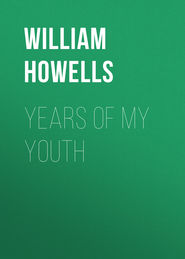По всем вопросам обращайтесь на: info@litportal.ru
(©) 2003-2024.
✖
Imaginary Interviews
Настройки чтения
Размер шрифта
Высота строк
Поля
"Yes, but it was more racial, more personal, than natural. It was delicious, but we are not sure we approved of it."
"Ah, in Italian opera you're not asked to approve; you're only desired to enjoy!"
"Well, then that bit of racial personality was of the effect of actuality, and it jarred."
"Perhaps you're right," the reader sighed, but he added: "It was charming; yes, it made itself part of the piece. Nemorino would have done just as Caruso did."
At the last fall of the curtain the reader and the writer rose in unison, a drop of that full tide of life which ebbed by many channels out of the vast auditorium, and in two or three minutes left it dry. They stayed in their duplex personality to glance at the silken evanescences from the boxes, and then, being in the mood for the best society, they joined the shining presences in the vestibule where these waited for their carriages and automobiles. Of this company the interlocutors felt themselves so inseparably part that they could with difficulty externate themselves so far as to observe that it was of the quality of "the town" which had gone to Italian opera from the first.
In Mr. Spectator's time the town would have been lighted by the smoky torches of linkboys to its chairs; now it was called to its electric autos in the blaze of a hundred incandescent bulbs; but the difference was not enough to break the tradition. There was something in the aspect of that patrician throng, as it waited the turn of each, which struck the reader and writer jointly as a novel effect from any American crowd, but which the writer scarcely dares intimate to the general reader, for the general reader is much more than generally a woman, and she may not like it. Perhaps we can keep it from offending by supposing that the fact can be true only of the most elect socially, but in any case the fact seemed to be that the men were handsomer than the women. They were not only handsomer, but they were sweller (if we may use a comparative hitherto unachieved) in look, and even in dress.
How this could have happened in a civilization so peculiarly devoted as ours to the evolution of female beauty and style is a question which must be referred to scientific inquiry. It does not affect the vast average of woman's loveliness and taste among us in ranks below the very highest; this remains unquestioned and unquestionable; and perhaps, in the given instance, it was an appearance and not a fact, or perhaps the joint spectator was deceived as to the supreme social value of those rapidly dwindling and dissolving groups.
The reader and the writer were some time in finding their true level, when they issued into the common life of the street, and they walked home as much like driving home as they could. On the way the reader, who was so remotely lost in thought that the writer could scarcely find him, made himself heard in a musing suspiration: "There was something missing. Can you think what it was?"
"Yes, certainly; there was no ballet."
"Ah, to be sure: no ballet! And there used always to be a ballet! You remember," the reader said, "how beatific it always was to have the minor coryphees subside in nebulous ranks on either side of the stage, and have the great planetary splendor of the prima ballerina come swiftly floating down the centre to the very footlights, beaming right and left? Ah, there's nothing in life now like that radiant moment! But even that was eclipsed when she rose on tiptoe and stubbed it down the scene on the points of her slippers, with the soles of her feet showing vertical in the act. Why couldn't we have had that to-night? Yes, we have been cruelly wronged."
"But you don't give the true measure of our injury. You forget that supreme instant when the master-spirit of the ballet comes skipping suddenly forward, and leaping into the air with calves that exchange a shimmer of kisses, and catches the prima ballerina at the waist, and tosses her aloft, and when she comes down supports her as she bends this way and that way, and all at once stiffens for her bow to the house. Think of our having been defrauded of that!"
"Yes, we have been wickedly defrauded." The reader was silent for a while, and then he said: "I wonder if anybody except the choreographic composer ever knew what the story of any ballet was? Were you ever able to follow it?"
"Certainly not. It is bad enough following the opera. All that one wishes to do in one case is to look, just as in the other case all one wishes to do is to listen. We would as lief try to think out the full meaning of a Browning poem in the pleasure it gave us, as to mix our joy in the opera or the ballet with any severe question of their purport."
VI
THE SUPERIORITY OF OUR INFERIORS
The satirical reader introduced himself with a gleam in his eye which kindled apprehension in the unreal editor's breast, and perhaps roused in him a certain guilty self-consciousness.
"I didn't know," the reader said, "that you were such a well-appointed arbiter elegantiarum."
"Meaning our little discourse last month on the proper form of addressing letters?" the editor boldly grappled with the insinuation. "Oh yes; etiquette is part of our function. We merely hadn't got round to the matter before. You liked our remarks?"
"Very much," our visitor said, with the fine irony characteristic of him. "All the more because I hadn't expected that sort of thing of you. What I have expected of you hitherto was something more of the major morality."
"But the large-sized morals did not enter into that scheme. We deal at times with the minor morality, too, if the occasion demands, as we have suggested. You should not have been surprised to find politeness, as well as righteousness, advocated or applauded here. Naturally, of course, we prefer the larger-sized morals as questions for discussion. Had you one of the larger-sized questions of morality to present?"
"I was thinking it was a larger-sized question of manners."
"For example."
"The experience of one of those transatlantic celebrities who seem to be rather multiplying upon us of late, and who come here with a proclamation of their worship of American women ready to present, as if in print, to the swarming interviewers on the pier, and who then proceed to find fault with our civilization on every other point, almost before they drive up to their hotels."
"But isn't that rather an old story?"
"I suppose it is rather old, but it always interests us; we are never free from that longing for a flattered appearance in the eyes of others which we so seldom achieve. This last, or next to last, celebrity – in the early winter it is impossible to fix their swift succession – seems to have suffered amaze at the rude behavior of some dairymaids in the milk-room of the lady who was showing the celebrity over her premises. I didn't understand the situation very clearly. The lady must have been a lady farmer, in order to have a milk-room with dairymaids in it; but in any case the fact is that when the lady entered with the celebrity the maids remained seated, where they were grouped together, instead of rising and standing in the presence of their superiors, as they would have done in the hemisphere that the celebrity came from."
"Well, what came of it?"
"Oh, nothing. It was explained to the celebrity that the maids did not rise because they felt themselves as good as their mistress and her guest, and saw no reason for showing them a servile deference: that this was the American ideal."
"In the minds of those Swedish, Irish, English, Polish, German, or Bohemian dairymaids," we murmured, dreamily, and when our reader roused us from our muse with a sharp "What?" we explained, "Of course they were not American dairymaids, for it stands to reason that if they were dairymaids they could not be Americans, or if Americans they could not be dairymaids."
"True," our friend assented, "but all the same you admit that they were behaving from an American ideal?"
"Yes."
"Well, that ideal is what the celebrity objects to. The celebrity doesn't like it – on very high grounds."
"The grounds of social inequality, the inferiority of those who work to those who pay, and the right of the superiors to the respect of the inferiors?"
"No, the politeness due from one class to another."
"Such as lives between classes in Europe, we suppose. Well, that is very interesting. Is it of record that the lady and her guest, on going into the milk-room where the dairymaids remained rudely seated, bowed or nodded to them or said, 'Good-day, young ladies'?"
"No, that is not of record."
"Their human quality, their human equality, being altogether out of the question, was probably in no wise recognized. Why, then, should they have recognized the human quality of their visitors?" Our satirical reader was silent, and we went on. "There is something very droll in all that. We suppose you have often been vexed, or even outraged, by the ingratitude of the waiter whom you had given a handsome tip, over and above the extortionate charge of the house, and who gathered up your quarter or half-dollar and slipped it into his pocket without a word, or even an inarticulate murmur, of thanks?"
"Often. Outraged is no word for it."
"Yes," we assented, feeling our way delicately. "Has it ever happened that in the exceptional case where the waiter has said, 'Thank you very much,' or the like, you have responded with a cordial, 'You're welcome,' or, 'Not at all'?"
"Certainly not."
"Why not?"
"Because – because – those are terms of politeness between – "
Our friend hesitated, and we interrogatively supplied the word, "Equals? There are always difficulties between unequals. But try this, some day, and see what a real gratitude you will get from the waiter. It isn't infallible, but the chances are he will feel that you have treated him like a man, and will do or say something to show his feeling: he will give a twitch to your under-coat when he has helped you on with your top-coat, which will almost pull you over. We have even tried saying 'You are welcome' to a beggar. It's astonishing how they like it. By-the-way, have you the habit of looking at your waiter when he comes to take your order; or do you let him stand facing you, without giving him a glance above the lower button of his poor, greasy waistcoat?"
"No, the theory is that he is part of the mechanism of the establishment."
"That is the theory. But it has its inconveniences. We ourselves used to act upon it, but often, when we found him long in bringing our order, we were at a loss which waiter to ask whether it would be ready some time during the evening; and occasionally we have blown up the wrong waiter, who did not fail to bring us to shame for our error."
"They do look so confoundedly alike," our visitor said, thoughtfully.
"We others look confoundedly alike to them, no doubt. If they studied us as little as we study them, if they ignored us as contemptuously as we do them, upon the theory that we, too, are part of the mechanism, the next man would be as likely as we to get our dinner."
"They are paid to study us," our visitor urged.
"Ah, paid! The intercourse of unequals is a commercial transaction, but when the inferiors propose to make it purely so the superiors object: they want something to boot, something thrown in, some show of respect, some appearance of gratitude. Perhaps those dairymaids did not consider that they were paid to stand up when their employer and the visiting celebrity came into the milk-room, and so, unless they were civilly recognized – we don't say they weren't in this case – they thought they would do some of the ignoring, too. It is surprising how much the superiors think they ought to get for their money from the inferiors in that commercial transaction. For instance, they think they buy the right to call their inferiors by their first names, but they don't think they sell a similar right with regard to themselves. They call them Mary and John, but they would be surprised and hurt if the butler and waitress addressed them as Mary and John. Yet there is no reason for their surprise. Do you remember in that entrancing and edifying comedy of 'Arms and the Man' – Mr. Bernard Shaw's very best, as we think – the wild Bulgarian maid calls the daughter of the house by her Christian name? 'But you mustn't do that,' the mother of the house instructs her. 'Why not?' the girl demands. 'She calls me Louka.'"
"Capital!" our friend agreed. "But, of course, Shaw doesn't mean it."
"You never can tell whether he means a thing or not. We think he meant in this case, as Ibsen means in all cases, that you shall look where you stand."











